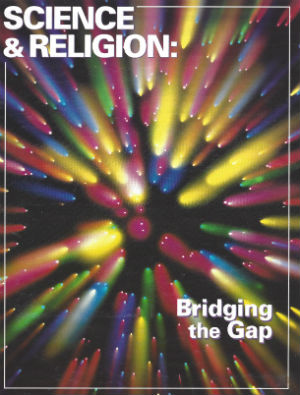A Muslim Writer Opines: What Is Really Behind the Evolution/Creation Debate?
 Mustafa Akyol
Mustafa Akyol(Ed. – A friend sent this some time back. Intelligent Design (ID) was being hotly debated at the time. ID has its problems as a Christian explanation for creation as Francis Collins points out in The Language of God, but Mustafa Akyol from Turkey is here showing the real essence of the evolutionary objection. Note his intriguing conclusion.)
There is a huge and growing body of ID literature produced by some of the world's finest minds…Yet I think an examination of the main premise behind the current opposition to ID might be helpful.
 Collins pushes beyind ID, nevertheless...
Collins pushes beyind ID, nevertheless...To see that premise, we first have to note how ID theorists criticize Darwin. They do this by applying his own criterion for falsification. "If it could be demonstrated that any complex organ existed which could not possibly have been formed by numerous, successive, slight modifications," said Darwin, "my theory would break down." ID theorists, such as biochemist Michael J. Behe, apply this criterion to complex biochemical systems such as the bacterial flagellum or blood clotting and explain that they could not have been "formed by numerous, successive, slight modifications" – because they don't function at all unless they are complete.
Esape to the Future?
What is the Darwinian response to this? Here's Jerry Coyne again, in The New Republic: "In view of our progress in understanding biochemical evolution, it is simply irrational to say that because we do not completely understand how biochemical pathways evolved, we should give up trying and invoke the intelligent designer." Note that Coyne is here denying the falsification criterion that Darwin himself acknowledged. According to Darwin, if you demonstrate "that any complex organ existed which could not possibly have been formed by numerous, successive, slight modifications," the theory will break down. According to Coyne, you will only be pointing to a system about which "we do not completely understand how [it] evolved."
In other words, Coyne leaves no way that the theory can break down. Whatever problem you find with the theory today will somehow be solved in the future. Actually Coyne, quite generously, does give a criterion to refute Darwinism: Should we "find human fossils co-existing with dinosaurs, or fossils of birds living alongside those of the earliest invertebrates," that would "sink neo-Darwinism for good." But ID proponents aren't questioning the fact that dinosaurs predated humans and invertebrates predated birds; our question, rather, is how they came to be. Coyne sounds like someone who would silence a serious critique of the theory of plate tectonics by saying, "Hey, show me that the Earth is flat and thus sink my theory for good, or shut up forever."
With his solid faith in Darwinism, Coyne also assures us that the gaps in the fossil record – which should have been filled by the 150-year-long desperate search for the fossilized remains of numerous, successive, slight modifications – "are certainly due to the imperfection of the fossil record."
But why can't we consider the possibility that the gaps might be real – that forms of complex life might have appeared on Earth in the way they are, as the fossil record suggests? The standard reply to this question is the "god of the gaps" argument: that theists have imagined divine powers behind natural phenomena in the past, and science, in time, unveiled the natural processes behind those phenomena. But if we had seen a cumulative filling of gaps since Darwin, we would have agreed. What we have actually seen is the reverse: Ever since Darwin, and especially in recent decades, the problems with the theory of evolution have been deepening and widening. With the discovery of the unexpected complexity of biology, and the sudden leap forward in the history of life with the Cambrian explosion, the Darwinian theory turns out to be based on an atheism of the gaps, in which lack of knowledge about life led to the wrong assumption that it is simple enough to be explained by a non-design theory.
 Our debt to Islamic Science is vast.
Our debt to Islamic Science is vast.God & Muslims
There are many other attacks on ID in the media, and they are all useful in that they demonstrate the true intellectual force behind Darwinism: a commitment to materialism. The most common argument against ID, that it invokes God and so cannot be a part of science, is a crystal-clear expression of that commitment. Instead of asking, "What if there really were an intelligent designer active in the origin of life?" the Darwinists take it for granted that such a designer doesn't exist and limit the definition of science according to that unproven premise.
Similarly, the evidence for the existence of a pre-Sumerian civilization would not be "a part of history" if you define history as "the discipline that examines the past of human societies starting from the Sumerians and never, ever, accepting the possibility of something else before." A saner approach would be to question the definition of the discipline that is challenged by evidence — not to ignore the evidence in order to save the definition of the discipline. The reason this saner approach is not the mainstream view in biology is the same old dogmatic belief: materialism.
The Objective/Subjective Tension
Of course, Darwinians have the right to believe in whatever they wish, but it is crucial to unveil that theirs is a subjective faith, not an objective truth, as they have been claiming for more than a century. This unveiling would mark a turning point in the history of Western civilization, by reconciling science and religion and letting people become intellectually fulfilled theists. Moreover, it would mark a turning point in the history of the world, by changing the meaning of "the West" and "Westernization" in the eyes of Muslims. They have been resisting the influx of godlessness from the West for a long time; they would be much less alarmed in the face of a redeemed West.
Phillip E. Johnson once said that the ID debate is about the question whether the U.S. is a nation under God or a nation under Darwin. We Muslims see the latter as a plague; we have no problem with the former. We might have disagreements, but we agree on the most fundamental truth of all — that there really is a God out there, and He is the One to Whom we owe our very life and existence.
Mustafa Akyol is a Muslim writer based in Istanbul, Turkey, and one of the expert witnesses who testified to the Kansas State Education Board during the hearings on evolution. His website is http://www.mustafaakyol.org.
https://www.nationalreview.com/2005/12/under-god-or-under-darwin-mustafa-akyol/